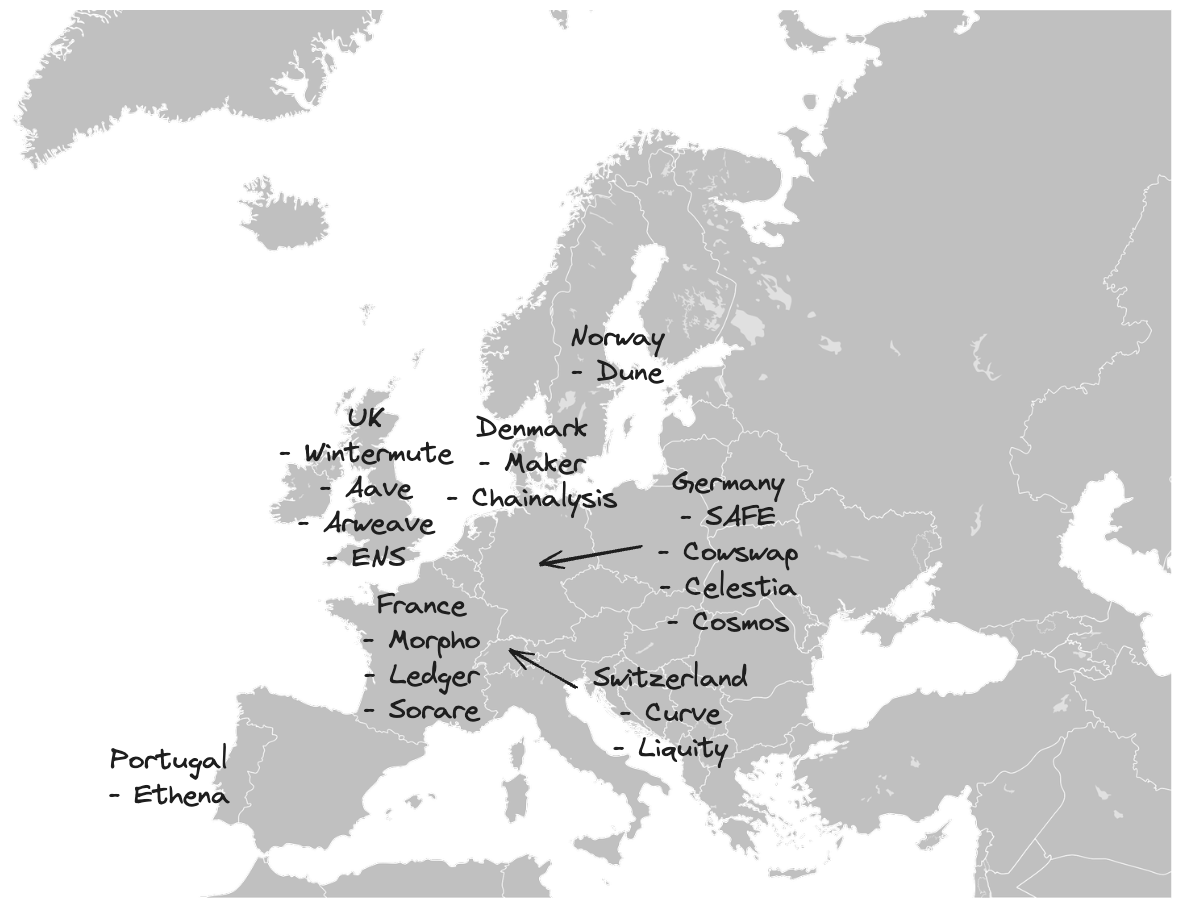Europe: at the heart of crypto
Most major waves in information technology have been centred in the U.S. Breakthroughs in the internet, cloud computing, mobile, and AI, along with the influential companies that emerged from these developments, largely originated there.
Crypto breaks that pattern. Entrepreneurial activity is not as concentrated in the US but is instead a more global phenomenon.
Europe in particular, has punched above its weight, especially when one considers its relative importance in other areas of technology. Some of the most important crypto projects and companies have emerged from the region.
The figure below shows just some of them. Additionally, while Ethereum and Lido are difficult to pin on one specific country, they also emerged from Europe.

There are several views that can explain Europe’s relative outperformance in crypto.
The first is that the Silicon Valley startup culture has been exported to the rest of the world. There are now more developed technology ecosystems across the globe that can support startups on their path to becoming category-leading companies. As a result, founders no longer need to move to Silicon Valley to fulfil their ambitions.
Paradoxically, a lot of the founders building AI companies are moving to Silicon Valley. However, I think that's a specific characteristic of AI. If you’re building in AI, you need chips and you need compute. Nvidia is based in the Valley, as are the likes of Microsoft, Google, Meta etc. Startups have a greater dependence on these incumbents, and as a result, seek geographic proximity.
Secondly, Europe has a history of developing open source software. Linus Torvalds, a Finnish computer scientist, developed both Linux and Git. The vast majority of servers use the Linux operating system, making it one of the most widely used operating systems in the world, while Git is the version control system that underpins Github and Gitlab. Other projects like ElasticSearch and MySQL came from the Netherlands and Sweden respectively. Crypto is based largely on open source software and is similar in its cyberpunk culture to previous open source movements. This point pertains less to newer teams that are not necessarily as motivated by ideology, but certainly explains why earlier projects like Ethereum, SAFE / Cowswap and Maker were started in Europe.
Thirdly, it’s precisely because Europe doesn’t have large Internet companies that crypto is thriving there. Crypto is a direct response / counter culture to the large Internet companies. In that way it is different to a technology like AI, which is built on years of advancements in cloud and data infrastructure. The fact that none of the big Internet companies are based in Europe has its obvious disadvantages for the region, but one of the unintended benefits is that it creates space for the emergence of completely new advancements. Young and talented people that would have otherwise worked at Google or Meta, instead work on technologies to disrupt them.
It’s important to note that the crypto industry in Europe has flourished in spite of the actions of governments and regulators, not because of them. The MiCA regulatory framework that is being rolled out across the EU promises to create a clear and consistent rulebook for entrepreneurs and investors, but its practicality and ultimate success remain to be seen. It is my hope that these institutions will start to recognise crypto's potential and choose to support Europe's continued position at the heart of the industry.
